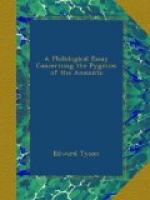[Footnote A: Plinij Nat. Hist. lib. 6. cap. 30. p.m. 741.]
[Footnote B: Plinij. Nat. Hist. lib. 7. cap. 2. p.m. 11.]
Ctesias I find is the only Author that ever understood what Language ’twas that the Pygmies spake: For Herodotus[A] owns that they use a sort of Tongue like to no other, but screech like Bats. He saith, [Greek: Hoi Garamantes outoi tous troglodytas Aithiopas thaereuousi toisi tetrippoisi. Hoi gar Troglodytai aithiopes podas tachistoi anthropon panton eisi, ton hymeis peri logous apopheromenous akouomen. Siteontai de hoi Troglodytai ophis, kai Saurous, kai ta toiauta ton Herpeton. Glossan de oudemiaei allaei paromoiaen nenomikasi, alla tetrygasi kathaper hai nukterides;] i.e. These Garamantes hunt the Troglodyte AEthiopians in Chariots with four Horses. The Troglodyte AEthiopians are the swiftest of foot of all Men that ever he heard of by any Report. The Troglodytes eat Serpents and Lizards, and such sort of Reptiles. They use a Language like to no other Tongue, but screech like Bats.
[Footnote A: Herodot. in Melpomene. pag. 283.]
Now that the Pygmies are Troglodytes, or do live in Caves, is plain from Aristotle,[A] who saith, [Greek: Troglodytai de’ eisi ton bion]. And so Philostratus,[B] [Greek: Tous de pygmaious oikein men hypogeious]. And methinks Le Compte’s Relation concerning the wild or savage Man in Borneo, agrees so well with this, that I shall transcribe it: for he tells us,[C] That in Borneo this wild or savage Man is indued with extraordinary strength; and not withstanding he walks but upon two Legs, yet he is so swift of foot, that they have much ado to outrun him. People of Quality course him, as we do Stags here: and this sort of hunting is the King’s usual divertisement. And Gassendus in the Life of Peiresky, tells us they commonly hunt them too in Angola in Africa, as I have already mentioned. So that very likely Herodotus’s Troglodyte AEthiopians may be no other than our Orang-Outang or wild Man. And the rather, because I fancy their Language is much the same: for an Ape will chatter, and make a noise like a Bat, as his Troglodytes did: And they undergo to this day the same Fate of being hunted, as formerly the Troglodytes used to be by the Garamantes.
[Footnote A: Arist. Hist. Animal., lib. 8. cap. 15. p.m. 913.]
[Footnote B: Philostrat. in vita Appollon. Tyanaei, lib. 3. cap. 14. p.m. 152.]
[Footnote C: Lewis le Compte Memoirs and Observations on China, p.m. 510.]




